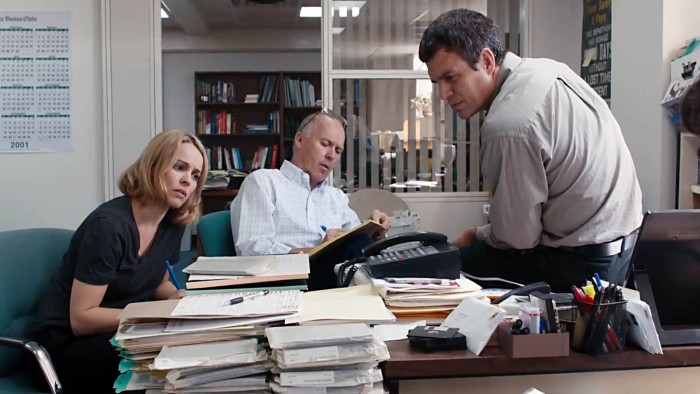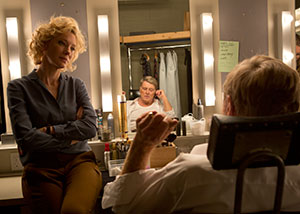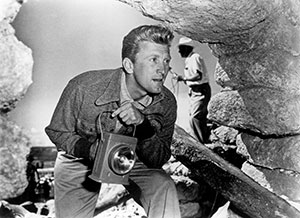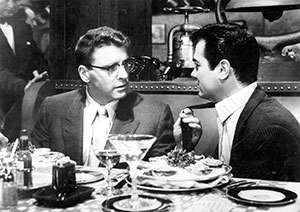Journalism in the movies

Roula Khalaf, Editor of the FT, selects her favourite stories in this weekly newsletter.
“I hate newspaper men,” Orson Welles told an interviewer in 1960. The sentiment had a certain clout. Welles, after all, was the man whose portrait of press ownership in Citizen Kane (1941) cemented forever the link between cinema and journalism: two grand 20th-century enterprises then run by much the same kind of swaggering tycoon.
Movie studios and news operations still often share owners, albeit now sprawling conglomerates. But long after Welles, the director Tom McCarthy takes a warmer view of journalists. His new film, Spotlight, is the story of the Boston Globe investigative team who in 2001 uncovered the mass sheltering of paedophile priests by the Catholic Church. McCarthy has crossed paths with the trade before: as an actor, he played a crooked reporter in the final season of TV’s The Wire. Nevertheless, he believes in its better nature.
“When I was making The Wire I spent time on the Baltimore Sun, and what I saw was blue-collar craftsmanship, this rolling-up of the sleeves and just doing the hard work because you’re a curious person who wants to get to the truth.”
McCarthy, 49, began his career as a director in 2003 with the admired low-budget drama The Station Agent. At home in New York, he mostly consumes his news in print and, when he wrestles the iPad from his children, with paid subscriptions. “Why should journalism be free?” he asks. “It’s like sushi. I don’t want the cheap kind, I want the good kind.” The journalism in Spotlight is the good kind, built on awkward questions and carefully considered minutiae. In a film loaded with star power — the cast includes Mark Ruffalo, Rachel McAdams and Michael Keaton — the lack of glamour is heady, the dogged, strip-lit world of investigative journalists instantly recognisable.
The obvious comparison is All the President’s Men, the revered 1976 account of the Washington Post’s exposure of the Watergate scandal, its reporters Bob Woodward and Carl Bernstein played by Robert Redford and Dustin Hoffman. Another stellar tale of gross wrongdoing the world would otherwise have never known about, Spotlight is the kind of film about journalism that journalists enjoy; it’s also the bookies’ favourite to win Best Picture at next month’s Oscars.
Which could be welcome news for journalism itself. In 2001, the Boston Globe was just starting to lose advertising revenue to classifieds website Craigslist. The subsequent bloodbath across the industry has been especially savage in regional US papers. Endangered, too, is the art of investigative reporting, a famous devourer of time and resources freighted with the risk of legal action.
To write the movie, McCarthy hired as collaborator Josh Singer, whose script for The Fifth Estate (2013) had studied the troubled relationship between the Guardian and the mercurial Julian Assange. Unlike that tangle, the story behind the Globe investigation hadn’t first been assembled into a book, leaving McCarthy and Singer to connect up events at a distance of more than a decade. So began nine months of interviews in Boston with the reporters of the paper’s “Spotlight” team, who generally had other things to do and a limited desire to become movie characters.

“Journalists make horrible interview subjects. They all have their own way to evade you.” Slowly, the pair drew out small details to reveal the big picture. “The more we kept digging, going back to Boston to check and recheck, the more we found an echo between our process and theirs.”
A mantra of “keep pushing” eventually led McCarthy and Singer to realise that, years before the Globe revelations, one of the Spotlight team had blown a chance to break the story. Raising the issue was hugely uncomfortable — “this was someone we now knew well and was the hero of our story” — but the spirit of the piece demanded it appear on screen.
Thus Spotlight ends up as a film about brave reporting that is itself bravely reported: a rare enough quality in journalism, let alone the smooth-cornered world of movies.
McCarthy sees the response to his film as hopeful. “You see a rekindled passion for craft now, and in journalism it’s that sense of the lonely figure entering names into a database or scouring old clippings in a library.”

But let’s be frank: there is an irony to film embracing journalism as a trusty underdog. Movies have been made about the press at least as far back as the screwball His Girl Friday (1940), and most have painted it as a snakepit. Citizen Kane was just the biggest, its subject’s gargantuan ego finding its natural home in the crass, headline-obsessed “yellow journalism” of 1890s America.
Billy Wilder was harsher still in 1951’s Ace in the Hole. None of the sweetness of Some Like It Hot here. Instead, Kirk Douglas snarls and sneers as newsman Chuck Tatum, marooned in Albuquerque after disgraces back in New York. Salvation arrives when a local man is caught in a collapsed desert cave. Tatum, claiming the scoop, spends the film conniving to ensure the victim stays trapped and, on the front page, his own byline firmly attached.
But even Tatum paled beside the dark figure at the heart of that great Hollywood monster movie Sweet Smell of Success (1957): Manhattan gossip columnist JJ Hunsecker, loomingly played by Burt Lancaster. Terrorising show business hopefuls and servile publicists as well as his own sister, here the power of the press was matched only by the spite with which it was used.
In Ace in the Hole, Tatum stepped on people to get back to the big time. For Hunsecker, it was a raison d’être. The years between Citizen Kane in 1941 and Sweet Smell of Success in 1957 mirror the popular heyday of American newspapers. Can we see in Hollywood’s distaste the nobbling of a rival for public attention?

It would be 20 years before All the President’s Men, and the reinvention of the journalist as faintly countercultural leading man. The blueprint endured: a chiselled anti-hero with a notebook, typically played for years to come by the likes of Mel Gibson (The Year of Living Dangerously, 1982) or Russell Crowe (State of Play, 2009).
Even lone wolves struggled, though, when the papers began to vanish. In the 2000s, the early disruptions of the digital era were made worse by professional scandals. Stephen Glass, whose fabricated stories appeared in the New Republic, became the subject of a biopic, Shattered Glass, in 2003; plagiarist Jayson Blair of the New York Times inspired Scott Templeton, McCarthy’s ethics-free character in The Wire.
That same painful moment is now the backdrop for another new film about real-life journalism. This one is called Truth, which might be considered leading with the chin, and is set in the hairsprayed atmosphere of US TV news.
It concerns the revelations about George W Bush’s military record made by the programme 60 Minutes, ahead of the 2004 presidential elections. In a nod to past glories, there is a role for Robert Redford, cast as veteran anchor Dan Rather. Like Spotlight, Truth has movie star “oomph”, with 60 Minutes producer Mary Mapes played by Cate Blanchett.
But while filled with many more speeches on the nobility of journalism than McCarthy’s film, Truth makes a far less persuasive case for it. Minutes after airing, Mapes’s story is mired in counteraccusations about its research; there was a big enough hole in it for the Bush camp to taint the lot. In Truth, this is presented as a howling injustice; in truth, the story was botched, with dire consequences for all concerned. Maybe that’s why, next to Spotlight, it feels like a film with more excuses than insights.
But the two movies do share a status as period pieces. Since 2001 there has, of course, been spectacular journalism. Truth refers to “bloggers” in the tone people usually mention mosquitoes, but good reporting has happened online; the whistleblower Edward Snowden too will soon have his own “biographical drama”, directed by Oliver Stone. In Boston, the Spotlight team has actually expanded. Yet in most places, the kind of journalism that is its star is in peril. You may leave Spotlight wondering how many stories of similar scale now go undiscovered.
“I don’t think the public sees what we’ve already lost,” McCarthy says. If Spotlight does win the Best Picture Oscar, it will have got one up on Citizen Kane, a famous also-ran in 1941. The timing could hardly be better for the newspaper men to have their revenge.
‘Spotlight’ is released in the UK on January 29; ‘Truth’ on March 4
Photographs: Rex; LMK; Alamy
Comments